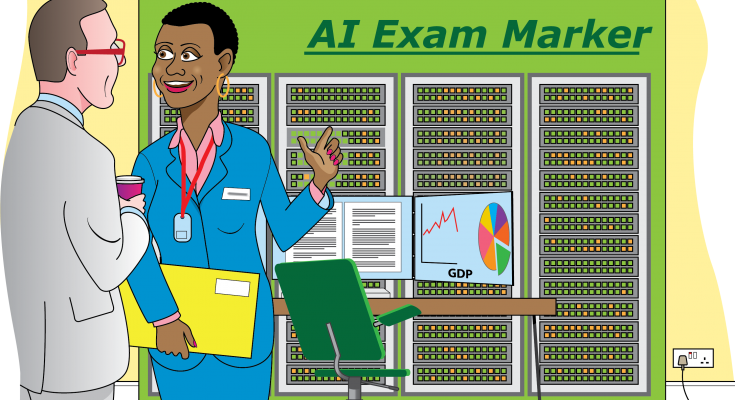“We input pluralist economics perspectives and now it is designing a space craft to leave earth.”
Teaching isn’t what is used to be. Exams need to be the same. Nigella Vigoroso-Heck looks at the options.
Disruption is everywhere. The traditional processes of industry are falling away and news stories abound with warnings that robots are about to take our jobs. As a teacher, I am continually told that I am preparing students for a world in which their future jobs don’t even exist yet.
And yet, as a teacher, I also seem to be part of society that arrogantly assumes it is above automation; that there simply isn’t a viable replacement for a human teacher.
But education has already been disrupted.
The information you need to pass an exam is no longer contained between the shoulders of your teacher, it is found on many different media platforms. Read the ebook. Don’t like the ebook? Read the bitesize revision cards. Don’t want the cards? Watch the Youtube videos. Or listen to the podcast. Test yourself on a multiple-choice quiz app. Get your assignments graded online … the list is endless.
“Anyone can be a student now. More importantly though, anyone can be a teacher.”
The provision of educational resources has grown exponentially and anyone can be a student now. More importantly though, anyone can be a teacher.
From a pluralist economics point of view, we should be happy about the impact of disruption on our subject. Economic theory isn’t meant to be homogeneous; it’s not meant to be the same. Some resources will emphasise the efficiency of market systems above all else while others will focus on other areas. Some will critique the market system, some will try to unpick the bowl of spaghetti that is macroeconomics and some may try their hand at development economics. It is a fabulous example of highly competitive monopolistic competition: the product is differentiated, catering for the needs of different niche markets.
At the beginning of a course, the plethora of available resources can be daunting to a newbie student. But kids these days are resourceful (read this column in the previous edition) and they soon find their way – the most popular choices being multi-platform resources like Econplusdal, Tutor2u or OxfordBusinessTutor.
Ultimately, our students of economics win. They aren’t fixed to one school of economic thought anymore but they are exposed to many different points of view.
“Ultimately, our students of economics win. They aren’t fixed to one school of economic thought anymore”
The next industry to be disrupted will inevitably be the exam boards; they simplyhaven’t moved with the rest of education. 2015 heralded a new system of A-Levels (which was remarkably like the old system). The former education minister, Michael Gove, wanted a system that essentially replicated his own university experience: no modules just “finals” at the end. He asked the exam boards tostretch the most able students, prepare their candidates better for the demands of employment and to get away from the idea of teaching to test.
The economic exam boards have failed his test.
The exam boards cannot replicate the university finals experience. Academics have but a few dozen exam papers to mark at the end the year. England’s two largest exam boards (Edexcel and AQA) have tens of thousands.
“2015 heralded a new system of A-Levels (which was remarkably like the old system).”
At university it’s easy to get the impression that the only criterion for grading a paper is: “do I like this essay?” When you have tens of thousands of students demanding consistency of marking across the cohort, the “do I like this essay?” criterion is bankrupt. The marking scheme, therefore, inevitably becomes more rigid and, at that scale, it ends up squeezing out reward for flair and original thinking.
Economics essays, apparently, must be three “analysis” paragraphs followed by three “evaluative” paragraphs, where even the very nature of evaluation or the “acceptable forms of evaluation,” have been defined in a booklet.
Education should be more than this.
At university it’s easy to get the impression that the only criterion for grading a paper is: “do I like this essay?”
The mass-market exam board approach has narrowed the focus of the classroom experience and it stunts our students’ creative development just before they’re meant to go to university and blossom. The industry is ripe for disruption. Who will take on the mantle and start-up a new qualification – one for pluralist economics that recognises intellectual curiosity and breadth of understanding?




